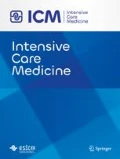Abstract
Objective
To compare the total plasma cortisol values obtained from three widely used immunoassays and a high pressure liquid chromatography (HPLC) technique on samples obtained from patients with sepsis.
Design and setting
Observational interventional in the general intensive care unit of a metropolitan hospital
Patients and participants
Patients admitted to the intensive care unit with a diagnosis of sepsis and fulfilling criteria of systemic inflammatory response syndrome.
Interventions
Standard short synacthen test performed with 250 μg cosyntropin.
Measurements and results
Two of the three immunoassays returned results significantly higher than those obtained by HPLC: Immulite by 95% (95%CI 31–188%) and TDx by 79% (21–165%). The limits of agreement for all three immunoassays with HPLC ranged from −62% to 770%. In addition, by classifying the patients into responders and non-responders to ACTH by standard criteria there was concordance in all assays in only 44% of patients.
Conclusions
Immunoassay estimation of total plasma cortisol in septic patients shows wide assay related variation that may have significant impact in the diagnosis of relative adrenal insufficiency.

References
Annane D, Sebille V, Charpentier C, Bollaert PE, Francois B, Korach JM, Capellier G, Cohen Y, Azoulay E, Troche G, Chaumet-Riffaut P, Bellissant E (2002) Effect of treatment with low doses of hydrocortisone and fludrocortisone on mortality in patients with septic shock. JAMA 288:862–871
Annane D, Sebille V, Troche G, Raphael JC, Gajdos P, Bellissant E (2000) A 3-level prognostic classification in septic shock based on cortisol levels and cortisol response to corticotropin. JAMA 283:1038–1045
Rydvall A, Brandstrom AK, Banga R, Asplund K, Backlund U, Stegmayr BG (2000) Plasma cortisol is often decreased in patients treated in an intensive care unit. Intensive Care Med 26:545–551
Sam S, Corbridge TC, Mokhlesi B, Comellas AP, Molitch ME (2004) Cortisol levels and mortality in severe sepsis. Clin Endocrinol (Oxf) 60:29–35
Clark PM, Neylon I, Raggatt PR, Sheppard MC, Stewart PM (1998) Defining the normal cortisol response to the short synacthen test: implications for the investigation of hypothalamic-pituitary disorders. Clin Endocrinol (Oxf) 49:287–292
McWhinney BC, Ward G, Hickman PE (1996) Improved HPLC method for simultaneous analysis of cortisol, 11-deoxycortisol, prednisolone, methylprednisolone, and dexamethasone in serum and urine. Clin Chem 42:979–981
Levy MM, Fink MP, Marshall JC, Abraham E, Angus D, Cook D, Cohen J, Opal SM, Vincent JL, Ramsay G (2003) 2001 SCCM/ESICM/ACCP/ATS/SIS International Sepsis Definitions Conference. Crit Care Med 31:1250–1256
Siraux V, De Backer D, Yalavatti G, Melot C, Gervy C, Mockel J, Vincent JL (2005) Relative adrenal insufficiency in patients with septic shock: comparison of low-dose and conventional corticotropin tests. Crit Care Med 33:2479–2486
Bouachour G, Tirot P, Gouello JP, Mathieu E, Vincent JF, Alquier P (1995) Adrenocortical function during septic shock. Intensive Care Med 21:57–62
Moore A, Aitken R, Burke C, Gaskell S, Groom G, Holder G, Selby C, Wood P (1985) Cortisol assays: guidelines for the provision of a clinical biochemistry service. Ann Clin Biochem 22:435–454
De Brabandere VI, Thienpont LM, Stockl D, De Leenheer AP (1995) Three routine methods for serum cortisol evaluated by comparison with an isotope dilution gas chromatography-mass spectrometry method. Clin Chem 41:1781–1783
Briegel J, Vogeser M, Annane D, Singer M, Keh D, Moreno R, Sprung C (2005) Correct identification of relative adrenal insufficiency in septic shock. Intensive Care Med [Suppl 1]:S160
Azziz R, Bradley E Jr, Huth J, Boots LR, Parker CR Jr, Zacur HA (1990) Acute adrenocorticotropin-(1–24) (ACTH) adrenal stimulation in eumenorrheic women: reproducibility and effect of ACTH dose, subject weight, and sampling time. J Clin Endocrinol Metab 70:1273–1279
Lashansky G, Saenger P, Fishman K, Gautier T, Mayes D, Berg G, Di Martino-Nardi J, Reiter E (1991) Normative data for adrenal steroidogenesis in a healthy pediatric population: age- and sex-related changes after adrenocorticotropin stimulation. J Clin Endocrinol Metab 73:674–686
Nye EJ, Grice JE, Hockings GI, Strakosch CR, Crosbie GV, Walters MM, Jackson RV (1999) Comparison of adrenocorticotropin (ACTH) stimulation tests and insulin hypoglycemia in normal humans: low dose, standard high dose, and 8-hour ACTH-(1–24) infusion tests. J Clin Endocrinol Metab 84:3648–3655
Dolezalova M (1994) Routine high-performance liquid chromatographic determination of urinary unconjugated cortisol using solid-phase extraction and ultraviolet detection. Clin Chim Acta 231:129–137
Santos-Montes A, Gonzalo-Lumbreras R, Izquierdo-Hornillos R (1995) Simultaneous determination of cortisol and cortisone in urine by reversed-phase high-performance liquid chromatography. Clinical and doping control applications. J Chromatogr B Biomed Appl 673:27–33
Cooper MS, Stewart PM (2003) Corticosteroid insufficiency in acutely ill patients. N Engl J Med 348:727–734
Author information
Authors and Affiliations
Corresponding author
Rights and permissions
About this article
Cite this article
Cohen, J., Ward, G., Prins, J. et al. Variability of cortisol assays can confound the diagnosis of adrenal insufficiency in the critically ill population. Intensive Care Med 32, 1901–1905 (2006). https://doi.org/10.1007/s00134-006-0389-x
Received:
Accepted:
Published:
Issue Date:
DOI: https://doi.org/10.1007/s00134-006-0389-x

